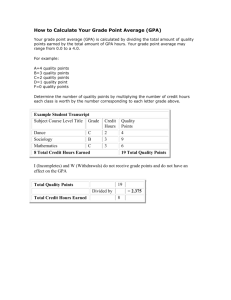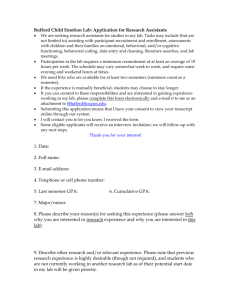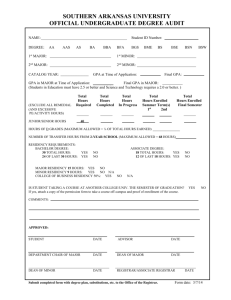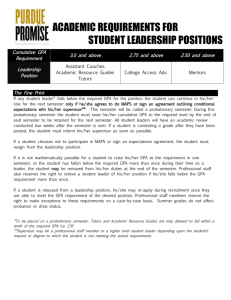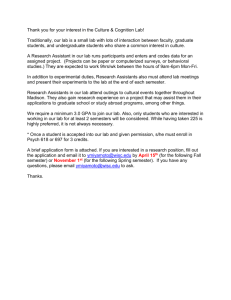1011 Grant Year
advertisement
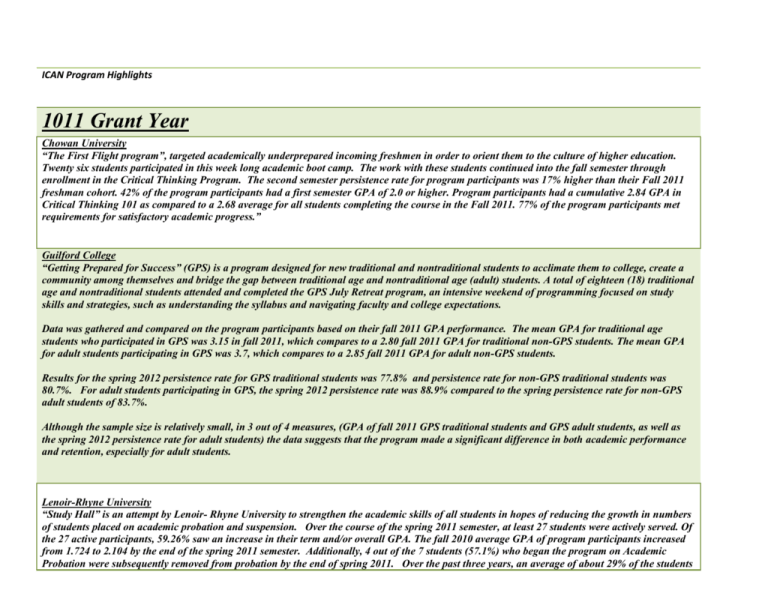
ICAN Program Highlights 1011 Grant Year Chowan University “The First Flight program”, targeted academically underprepared incoming freshmen in order to orient them to the culture of higher education. Twenty six students participated in this week long academic boot camp. The work with these students continued into the fall semester through enrollment in the Critical Thinking Program. The second semester persistence rate for program participants was 17% higher than their Fall 2011 freshman cohort. 42% of the program participants had a first semester GPA of 2.0 or higher. Program participants had a cumulative 2.84 GPA in Critical Thinking 101 as compared to a 2.68 average for all students completing the course in the Fall 2011. 77% of the program participants met requirements for satisfactory academic progress.” Guilford College “Getting Prepared for Success” (GPS) is a program designed for new traditional and nontraditional students to acclimate them to college, create a community among themselves and bridge the gap between traditional age and nontraditional age (adult) students. A total of eighteen (18) traditional age and nontraditional students attended and completed the GPS July Retreat program, an intensive weekend of programming focused on study skills and strategies, such as understanding the syllabus and navigating faculty and college expectations. Data was gathered and compared on the program participants based on their fall 2011 GPA performance. The mean GPA for traditional age students who participated in GPS was 3.15 in fall 2011, which compares to a 2.80 fall 2011 GPA for traditional non-GPS students. The mean GPA for adult students participating in GPS was 3.7, which compares to a 2.85 fall 2011 GPA for adult non-GPS students. Results for the spring 2012 persistence rate for GPS traditional students was 77.8% and persistence rate for non-GPS traditional students was 80.7%. For adult students participating in GPS, the spring 2012 persistence rate was 88.9% compared to the spring persistence rate for non-GPS adult students of 83.7%. Although the sample size is relatively small, in 3 out of 4 measures, (GPA of fall 2011 GPS traditional students and GPS adult students, as well as the spring 2012 persistence rate for adult students) the data suggests that the program made a significant difference in both academic performance and retention, especially for adult students. Lenoir-Rhyne University “Study Hall” is an attempt by Lenoir- Rhyne University to strengthen the academic skills of all students in hopes of reducing the growth in numbers of students placed on academic probation and suspension. Over the course of the spring 2011 semester, at least 27 students were actively served. Of the 27 active participants, 59.26% saw an increase in their term and/or overall GPA. The fall 2010 average GPA of program participants increased from 1.724 to 2.104 by the end of the spring 2011 semester. Additionally, 4 out of the 7 students (57.1%) who began the program on Academic Probation were subsequently removed from probation by the end of spring 2011. Over the past three years, an average of about 29% of the students who began the spring semester regained their eligibility by the end of the semester. N.C. Wesleyan College “Weekend College” was created in order to provide NCWC’s conditionally accepted students (Freshman Advantage participants) intensive college and academic readiness support as well as to assist in their transition from high school to college. Compared to the previous year, the average GPA of students attending Freshman Advantage rose by almost a letter grade. The percentage of students in good academic standing rose by roughly 29%. The number of students earning a 3.00 or better rose by 8.3%. Students who attended 100% or more of their study hall hours had an average GPA of 2.95. The number of P’s (Pass or Fail course) received in ENG 090 almost tripled. Based on the success on this program NCWC has changed its orientation program to allow all incoming freshmen and their families to participate in NCWC’s Extended Orientation. Shaw University In the Shaw “First Year Retreat” program, strategies were developed to provide students sustained ongoing social and academic support to fifty selected first year students over a month period. Students were provided peer tutoring and peer mentoring. Of first year students who attended the mentoring sessions, 65% found the topics to be informative and of interest and 60% of those students found the workshops to be a significant learning experience. Participating freshman registered for an average of 15.00 credit hours. By the end of the fall semester, they had earned an average of 12.20 credit hours with an average term grade point average of 2.08.” 1112 Grant Year. Cabarrus College of Health Sciences “Associate Science Prepared Informed Ready & Educated” (ASPIRE) Camp brought incoming students together for a day camp to increase the number of students entering professional programs at the end of two semesters. The results demonstrate that the goals of the program are being met. Of the 2012 Fall cohort, 64% entered a professional program after 2 semesters as compared to 55% of the 2010 cohort. Only 12% for the fall 2012 cohort withdrew from campus at the end of their first year. Thirty-two percent of the 2010 cohort withdrew after one year. The withdrawal rate was reduced by almost two thirds. Campbell University The “Supplemental Instruction Pilot” program offered two courses, General Chemistry I & II. Based on student performance, the program was successful in raising the level of academic performance of student participants. Preliminary analysis of student performance show that the students who attended 2 or more SI sessions scored on average 9 -10 points higher on the first exam than the class average and 9 points higher on the second exam.” Chowan University “The 1st Flight program” worked with 13 at-risk students during a 5-day residential program designed to orient students to the rigors of college life. The 2nd semester persistence rate of program participants was 57% higher than the persistence rate for students in the fall 2012 cohort. Additionally, 100% of the program participants enrolled at Chowan in the fall semester. The control group consisted of all admitted students including regular admitted students and those who were admitted conditionally. The 1st Flight program was deemed highly successful because the participant’s fall cumulative GPA was slightly higher than that of the control group.” Duke University “The IG Network: A Program for First Generation College Students”, is focused on providing programming activities and information to assist first generation students with high financial need to understand how to navigate the university and develop strong meaningful relationships with faculty. Survey results indicate that 98 % of student participants felt that their interactions with faculty were helpful; 92% indicated faculty shared information about their career paths; 94% indicated their experiences increased their confidence in working with faculty; and 98% indicated an increase in their knowledge of navigating the college environment.” Elon University The “Successful Transitions” program was developed to help underrepresented students to succeed in college and in life. As a part of the program, the Elon Academy, a college access and success program, designed and implemented a “Life after College” retreat for underrepresented college students in partnership with the Student Professional Development Center and the Multicultural Center at Elon. This was a three-day retreat to cover a range of topics, including graduate school, internships, securing a job, networking, and résumés. Quantitative results of the pre- and post-survey instrument to assess knowledge and skills related to career and graduate school planning show that prior to the retreat, 15% of participants felt confident in their resume writing skills and 77% felt confident about their resume writing skills after the retreat. On other pre-test and post-test measures, 0% of participants felt like they knew how to prepare for graduate school before the retreat and 77% felt confident on this test item after the retreat. Additionally, pre-test results show that 15% of participants knew how to facilitate a job search before the retreat and 100% of participants knew how to facilitate a job search after the retreat. Guilford College “Getting Prepared for Success” (GPS), is a program designed for new first generation at-risk traditional and nontraditional (adult) students in order to acclimate them to college, create a community among themselves and bridge the gap between traditional age and nontraditional/adult students. The program increased the number of participants from twenty to thirty students for fall 2012. Data was gathered and compared on the program participants based on their fall 2012 GPA performance. The fall 2012 GPA for traditional students who participated in GPS was 3.16 compared to a fall 2012 GPA of 2.72 for traditional non-GPS students. The mean GPA of nontraditional students who participated in GPS was 3.192; this compares to a fall 2012 GPA of 2.61 for new adult students (nontraditional) who did not participate in GPS. The spring 2013 persistence rate for traditional students participating in GPS was 100% compared to the persistence rate for traditional non-GPS students of 92.8%. The persistence rate for nontraditional students who participated in GPS was 88.8%. This compares to a persistence rate of 83.3% for non-GPS adult students On all four measures, the data suggests that the GPS program had a significant positive impact upon achievement and persistence of participants. Methodist University “Summer Academy III” was a summer bridge program with a cohort of 20 “at risk” students who enrolled in 5 semester hours of classes and participated in programs and services designed to equip them with the academic and social tools needed to experience success in college. Highlights of this program included a spring 2013 program attendee retention rate of 86% compared to the overall freshman spring retention rate of 80%. The summer attendee retention rate of at risk students was higher than that of the overall spring freshmen class. Additionally, comparisons can be made to a group of similar at risk students who were admitted under the same conditions, but did not attend the summer retention program. This comparison group had a retention rate of 61%. The data suggests that participation in the Summer Academy had a positive impact on student persistence. N.C. Wesleyan College “Extended Orientation” is a program designed to provide intensive college and academic readiness support for incoming freshmen, as well as, to assist in their transition from high school to college. Findings indicated that 85% of the students and parents were satisfied with their orientation experience. The retention rate for 1st year freshmen, from fall 2012 to spring 2013, slightly increased by more than 1% in comparison to the previous year; however, of the students enrolled in the fall orientation course, 80% had no more than one excused absence from class. Because of the overall positive impact in retention and class attendance, the Extended Orientation program has been sustained by the university. Pfeiffer University Pfeiffer sponsored two programs: an “Emerging Peer Leadership” class and a “Keys to Success” program. Twelve (12) Pfeiffer students participated in the Emerging Peer Leadership class and used the skills and theories learned to plan, implement, and evaluate a college overnight experience for 20 rising high school juniors. The participating students indicated a 45% increase in their knowledge of leadership theories and a 50% increase in their understanding of applying leadership tools. Ten (10) of the twelve (12) peer leaders served in various student leadership roles on campus. Of the high school participants in the college overnight experience, 20% indicated an increased knowledge of how to find scholarships and a 10% increase in knowledge of how to apply for college. Keys to Success provided 28 in-coming first year students with academic and social preparation for their first year at Pfeiffer University. Of the Keys to Success participants, 66% became involved with a student organization or sport as a result of participating in the class. Shaw University The “Freshman Summer Bridge Program” is designed to prepare at risk entering freshmen with the expectations and skills needed to succeed in college. Post survey results show that 93% of participants indicated the program provided opportunities to experience success; 86% indicated the program helped them to have a positive transition to college; 76.4% experienced a gain on the written communications assessment and 87% of students achieved improved results on the math post-test. Wake Forest University The Wake Forest University “Summer Bridge Program” was designed to serve as a successful transition to college for incoming first year students by immersing students into campus culture and to make them aware of the various opportunities that the participating offices in the Summer Bridge Program provide. Additionally, a secondary goal was to create a cohort of students among athlete and non-athlete students involved in the program. Program accomplishments included 100% retention of student Summer Bridge participants from Fall 2012 to Spring 2013 and 100% of the students indicated their intention to return for Fall 2013. All students made satisfactory academic progress. Three students ended the fall with a GPA under a 2.0; five students earned between 2.0-2.5 six students earned between 2.5-3.0; two students earned between 3.0-3.5; and three students earned Dean’s List for the fall 2012 with a GPA between 3.5-4.0.
